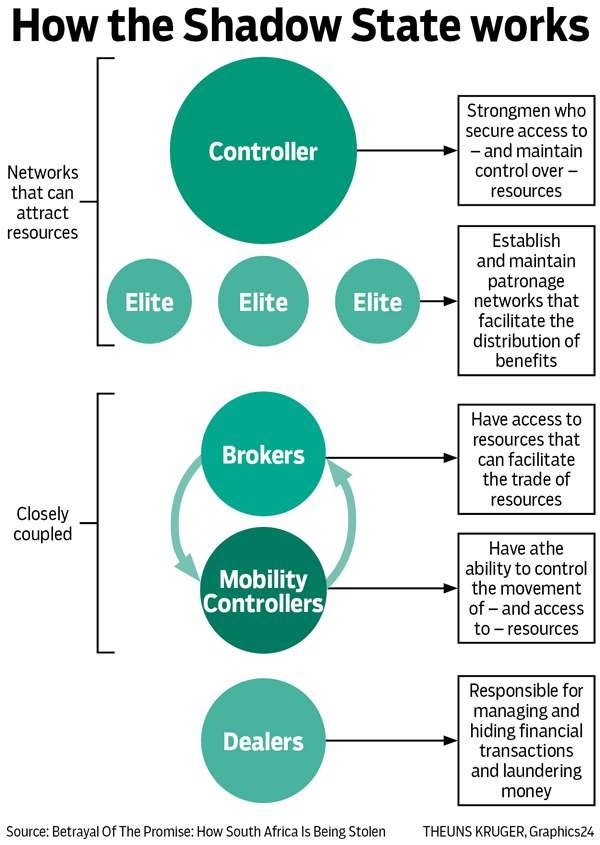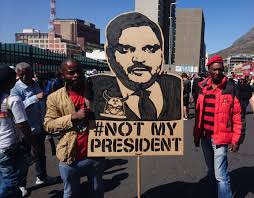The shocking extent to which state capture has proliferated over the last decade is painstakingly analysed in a new report compiled by academics and researchers from four universities.
The investigation found that the Guptas – close friends of President Jacob Zuma – earned R2,6-billion in 2016. However, evidence suggests the family’s companies were involved in transactions of R6,8-billion during 2015 and 2016 and that their earnings therefore may be much higher.
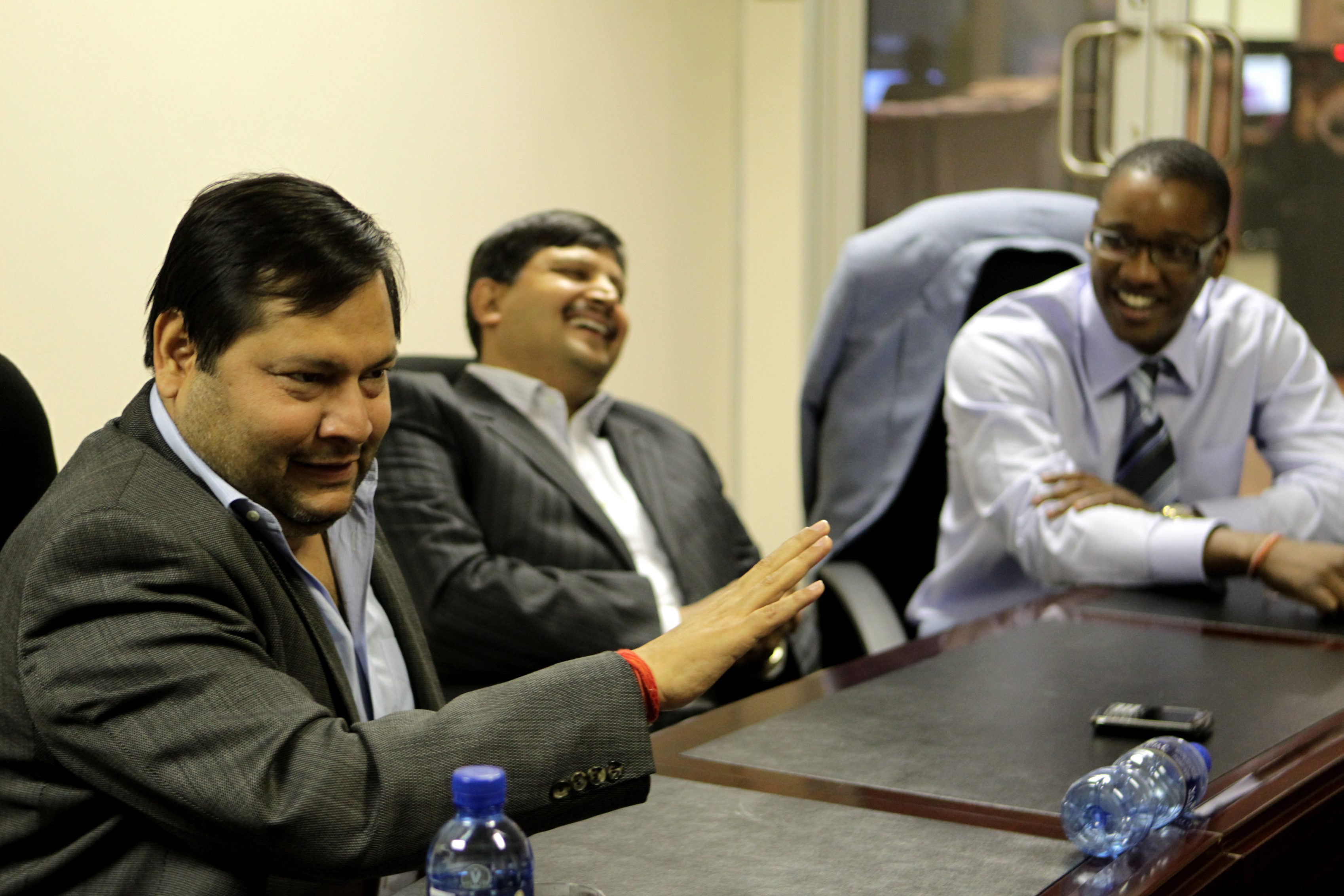 Ajay and Atul Gupta and Duduzane Zuma. The relationship between the Gupta and Zuma families appear to be the strongest network in the larger state capture environment.Gallo Images
Ajay and Atul Gupta and Duduzane Zuma. The relationship between the Gupta and Zuma families appear to be the strongest network in the larger state capture environment.Gallo Images
This is contained in a 63-page report compiled by nine academics and researchers affiliated to the universities of Stellenbosch, Cape Town, Johannesburg and the Witwatersrand, titled Betrayal of the Promise: How South Africa is Being Stolen.
It details the emergence of a so-called “shadow state”, a parallel structure which feeds off the state by establishing a network of patronage, corruption and state capture, as well as how this system works and thrives.
The research team – dubbed the State Capacity Research Project – argues on the basis of evidence in the public domain and their own investigations that a “silent coup” has taken place in South Africa.
According to researchers the relationship between Zuma and the Guptas is the linchpin that enabled the emergence and establishment of the shadow state: “At the nexus of this symbiosis between the constitutional and shadow states are 12 companies and 15 individuals connected in one way or another to the Gupta-Zuma family network. The way this is strategically coordinated constitutes the shadow state. Decisions made within this nexus about what happens within the constitutional state are executed by well-placed individuals located in the most significant centres of state power (in government, at state owned enterprises and the bureaucracy).”
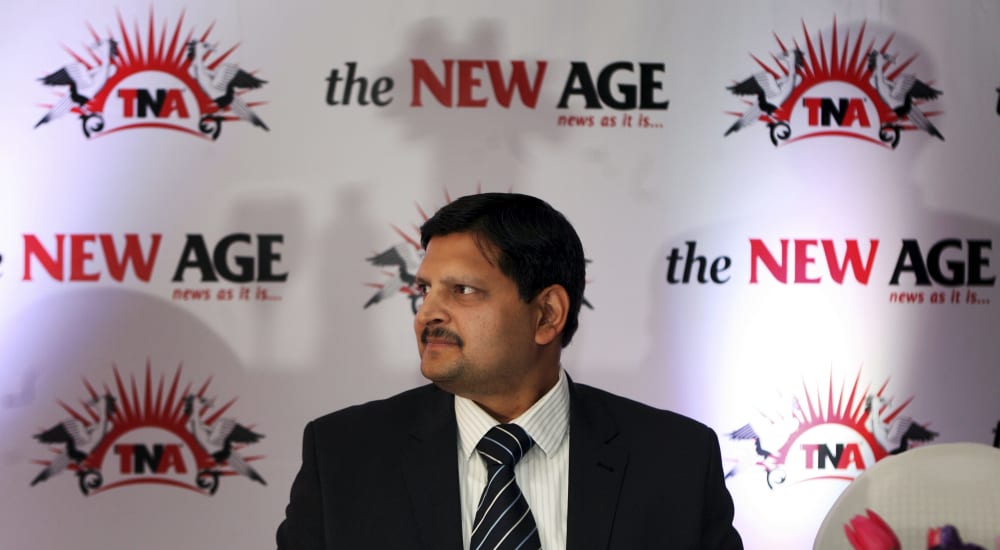 JOHANNESBURG, SOUTH AFRICA – JULY 21: Atul Gupta at the launch of the new national daily newspaper, called The New Age, on July 21, 2010, in Sandton, South Africa. The paper involves the Gupta Group, as well as former minister in the presidency, Essop Pahad. (Photo by Gallo Images / City Press / Leon Sadiki)Getty Images
JOHANNESBURG, SOUTH AFRICA – JULY 21: Atul Gupta at the launch of the new national daily newspaper, called The New Age, on July 21, 2010, in Sandton, South Africa. The paper involves the Gupta Group, as well as former minister in the presidency, Essop Pahad. (Photo by Gallo Images / City Press / Leon Sadiki)Getty Images
The report, published on Thursday, details:
** How the patronage network in the shadow state was established and what it looks like;
** What the Gupta family’s modus operandi entails;
** How the Guptas’ and their companies’ financial flows display the characteristics of money-laundering;
** How the shadow state was built;
** Why the Zuma “power elite” is at the centre of the shadow state; and
** What needs to be done to dismantle the system of patronage and state capture.
The removal of Pravin Gordhan as minister of finance during the April midnight cabinet reshuffle confirms this, the report says.
The research team – dubbed the State Capacity Research Project – argues on the basis of evidence in the public domain and their own investigations that a “silent coup” has taken place in South Africa. This coup was perpetrated by a network of government and political leaders, connected individuals and powerful families (like the Guptas) in order to secure unfettered access to state resources and to divert these to private interests.
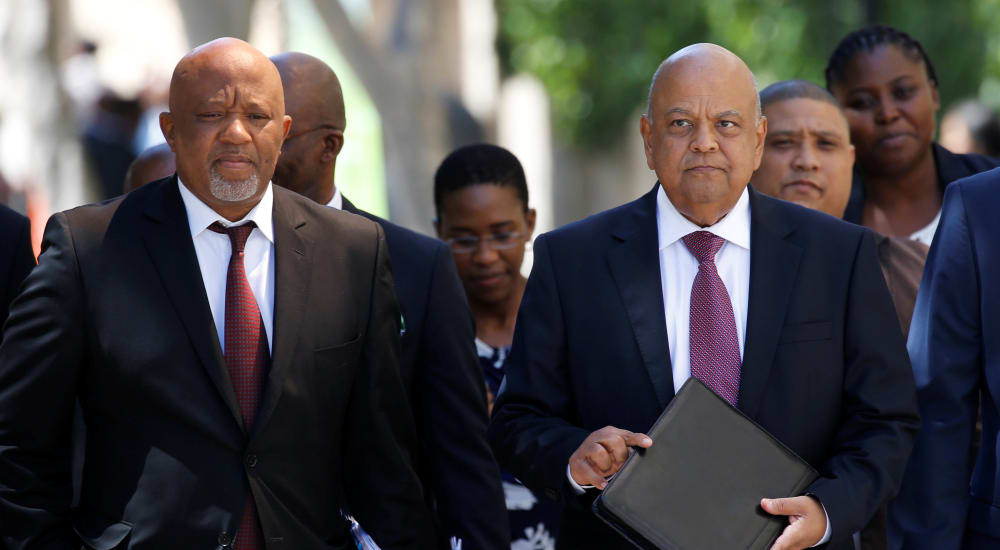 Former Deputy Minister of Finance Mcebisi Jonas (left) and Minister of Finance Pravin Gordhan were fired by President Jacob Zuma during a midnight cabinet reshuffle in April.Mike Hutchings / Reuters
Former Deputy Minister of Finance Mcebisi Jonas (left) and Minister of Finance Pravin Gordhan were fired by President Jacob Zuma during a midnight cabinet reshuffle in April.Mike Hutchings / Reuters
The removal of Pravin Gordhan as minister of finance during the April midnight cabinet reshuffle confirms this, the report says. “State capture is a far greater systemic threat (than corruption). It is akin to a silent coup and must, therefore, be understood as a political project that is given cover of legitimacy by the vision of ‘radical economic transformation’.”
What started off, according to our findings, as collusion in relatively low-level corruption between the Zuma family and the Guptas has evolved into state capture and the repurposing of state institutions.
The researchers have found that patronage networks draw on the informal power that their links to Zuma gives them, but that the relationship between the Zuma and Gupta families is by far the most important. Their influence reaches down to key individuals in state departments, state owned enterprises and also regulatory agencies and is used to advance their own interests.
“What started off, according to our findings, as collusion in relatively low-level corruption between the Zuma family and the Guptas has evolved into state capture and the repurposing of state institutions. In less than a decade the Zuma and Gupta families have managed to position themselves as a tight partnership that coordinates a power elite that aims to manage the rent seeking that binds the symbiotically connected constitutional and shadow states.
What unites this power elite is an ideological commitment to building a black business class, using state institutions to drive investment and growth, and streamlining through centralisation the control of rentseeking.
“What unites this power elite is an ideological commitment to building a black business class, using state institutions to drive investment and growth, and streamlining through centralisation the control of rentseeking. Different constituencies are attracted to different combinations of this political project, from those who simply want to be awarded state contracts to radicals pleased with more state intervention; from party loyalists terrified about electoral losses if the economy does not improve to a vast network of people who exchange loyalty for patronage,” the report says.
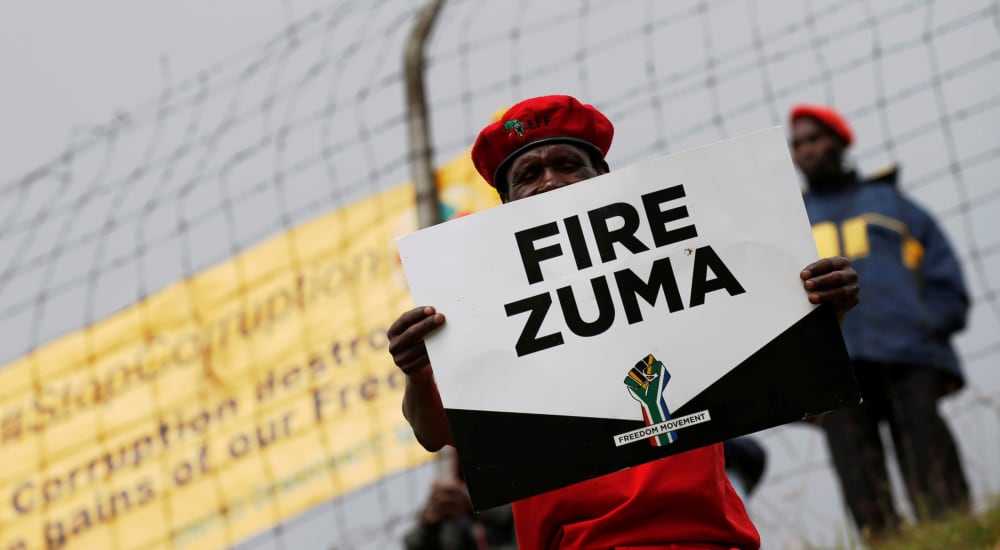 Supporters of various opposition parties hold placards calling for the removal of President Jacob Zuma outside the Constitutional Court in Johannesburg, South Africa, May 15, 2017. REUTERS/Mike HutchingsMike Hutchings / Reuters
Supporters of various opposition parties hold placards calling for the removal of President Jacob Zuma outside the Constitutional Court in Johannesburg, South Africa, May 15, 2017. REUTERS/Mike HutchingsMike Hutchings / Reuters
It further details the emergence of Zuma, how he went about reconfiguring the state in order to further his and his network’s aims and how fraud and corruption has flourished since.
The report is also our contribution to the broad struggle to save South African democracy . . . from a power elite that pursues its own interests at the expense of South African society . . .
The report cites three solutions to resolve the crisis:
1. The Gupta-Zuma network must be broken and dismantled.
2. A new, national economic consensus is needed.
3. All stakeholders must commit to this economic consensus within the framework of the Constitution.
The research team collaborated with the South African Council of Churches (SACC) on the project and information received during the SACC’s “unburdening process” was incorporated into the report. They will soon be releasing a number of case studies in support of the main report.
The investigation and report “is also our contribution to the broad struggle to save South African democracy . . . from a power elite that pursues its own interests at the expense of South African society, in particular the poorest people who will suffer first and most from the consequences of what is in reality a de facto silent coup.”
